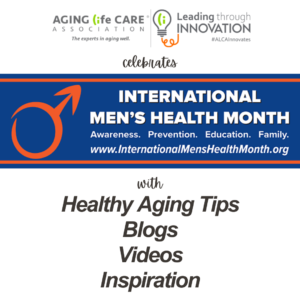The number of male caregivers is on the rise along with the average age of caregivers and the amount of stress impacting men’s health. According to a 2020 report “Caregiving in the U.S” by the National Alliance for Caregiving and AARP, 39% of family caregivers are male and 34% are Baby Boomers. Twenty-three percent of Americans say their health has become worse due to caregiving.
 June is Men’s Health Month, a national month-long observance used to raise awareness about health care for men, as established by the U.S. Department of Health and Human Services Office of Minority Health. To celebrate, the Aging Life Care Association (ALCA) will focus on men’s healthy aging through video interviews of Aging Life Care Professionals®, blog posts, and social media campaigns.
June is Men’s Health Month, a national month-long observance used to raise awareness about health care for men, as established by the U.S. Department of Health and Human Services Office of Minority Health. To celebrate, the Aging Life Care Association (ALCA) will focus on men’s healthy aging through video interviews of Aging Life Care Professionals®, blog posts, and social media campaigns.
And as the number of male caregivers has increased, the number of male professionals in the health and human services industry is also on the rise. ALCA Board Member Steve Barlam is excited to see the growth of male Aging Life Care Managers in the field. Barlam, who began his career in 1990 states, “To see how much impact care managers can have for a family caregiver by navigating the healthcare landscape for their loved one is so fulfilling. This is a career ripe for care managers who seek to grow their practice with the support of other male professionals.”
ALCA Western Region Board member Victor Alcala says that his experience as a hands-on caregiver for his grandfather led him to become a social worker, gerontologist, and open his Aging Life Care™ management practice. “Male caregivers sometimes struggle with that role for a variety of reasons. A major part of our job as care managers is to assess the existing caregiving structure and to figure out how best to support the client within that family system. There is a lid for every pot. Sometimes having a male care manager for a family is the right fit needed to make changes for the benefit of the client.”
Male family caregivers are often misperceived as assisting only with finance or transportation roles, but a Journal of Men’s Studies report suggests that men also provide key caregiving assistance with eating, bathing, and toileting tasks. And with men typically less likely to reach out for help, Aging Life Care Professionals are intent to bring the message of aging well to male caregivers and aging men.
One way to reduce the amount of stress – thus improving health – for a caregiver is by working with an Aging Life Care Manager. Through a client-centered, holistic approach, Aging Life Care Managers guide families to the actions and decisions that ensure quality care and an optimal life for those they love, thus reducing worry, stress and time off of work for family. To find an Aging Life Care Professional®, or learn how to become one, learn more at: aginglifecare.org